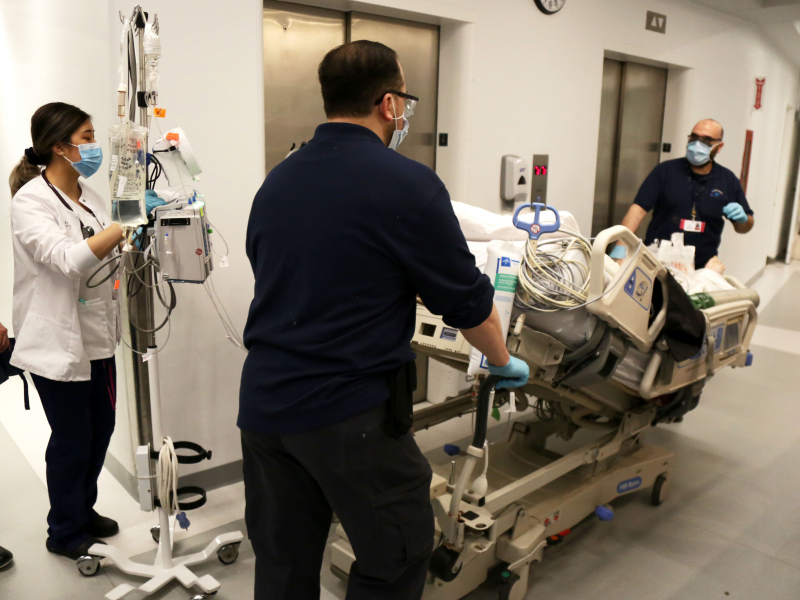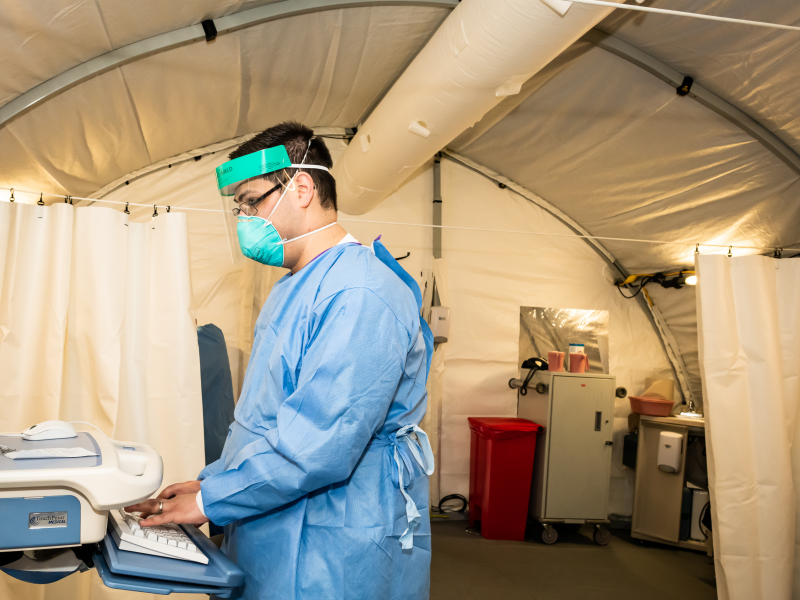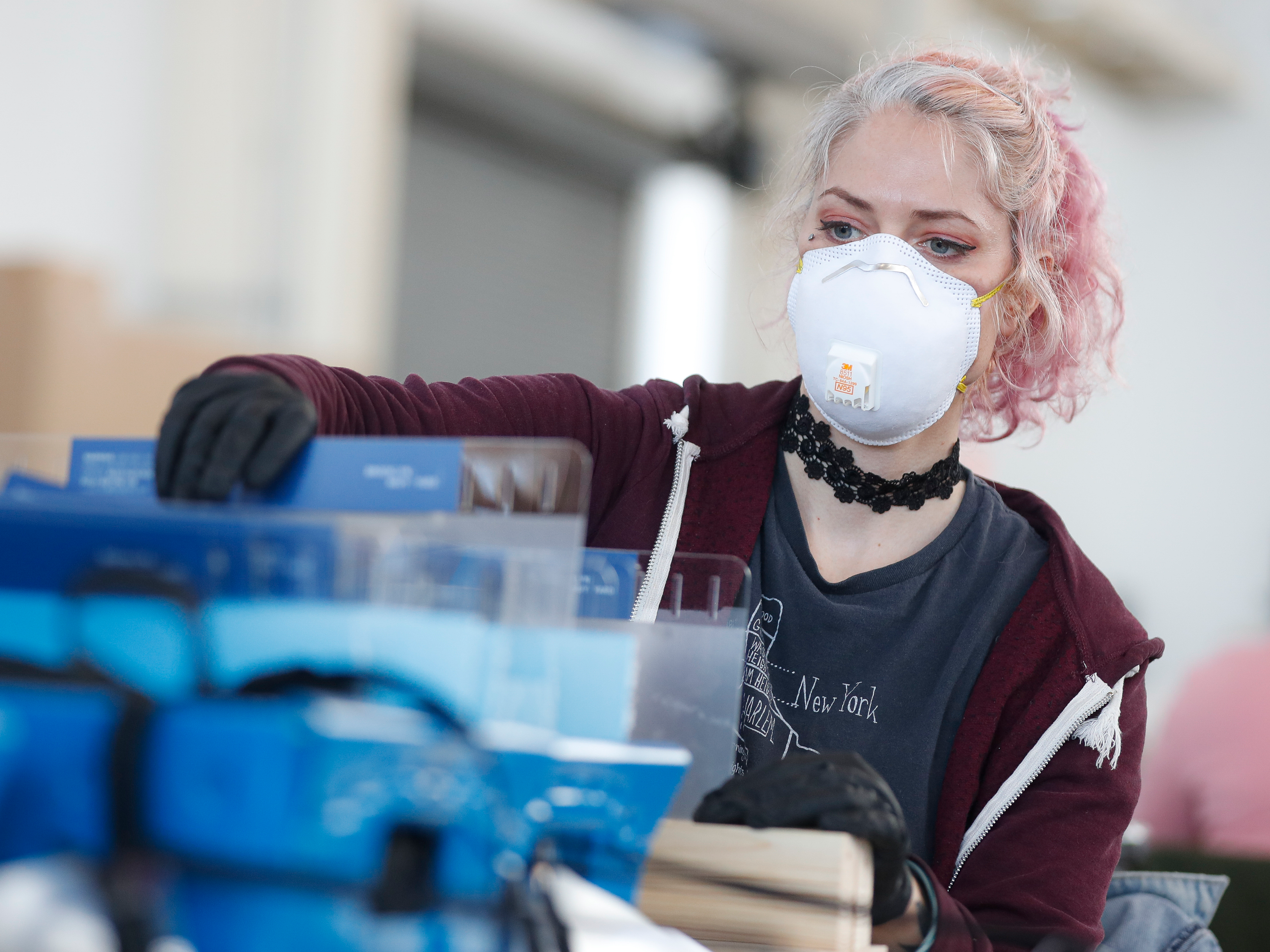Hello,
Welcome to Dispensed, Business Insider’s weekly healthcare newsletter. Hello from rainy Brooklyn, in which we’ve managed to restock the pantry and are contemplating how to make masks (In the meantime, fleece ski neck tubes seem to fit the bill).
The decade that was March is finally over. Can you believe just a few weeks ago there was only a headline or two about the novel coronavirus pandemic in these weekly briefings? As you might expect, I don’t imagine the subject matter will be changing too drastically anytime soon.
Are you new to the newsletter? You can sign up here.
This week, the world debated whether the general public should wear some kind of face mask when they leave the house, and we got more evidence on what's going on with asymptomatic spreading of COVID-19.
And coronavirus vaccine development took a turn as Johnson & Johnson sped up its timeline, Andrew Dunn reports.
Inside hospitals, the case counts - especially in New York City - kept rising.

The realities of fighting the coronavirus pandemic
This week, I spoke to Dr. Patrick Borgen, the chair of surgery at Maimonides Medical Center, a hospital here in Brooklyn. We talked a lot about how different the hospital is right now during "wartime."
For instance, on Tuesday, he counted 5 coding announcements go out signalling that a patient's health had quickly deteriorated. On a typical week, there might be one code every few days, he said.
"Until I saw this, I couldn't believe it," Borgen told me. He's hoping others around the country will take the pandemic seriously and get prepared now.
I've been checking in with Borgen pretty regularly to get a sense of what's changing over time. One of these weeks, he said, he's hoping to give me some better news about the state of the hospital amid the pandemic.
But it's not just NYC that's being hit hard at the moment.
Yeji Lee reports that places like New Orleans and Philadelphia could be part of the next wave of the pandemic. The South, in particular could be hit hard by the virus, according to data analysts with the University of Chicago.
And as the virus spreads, it's going to put some really big pressures on the system. Already, we're running short on certain drugs, including those used to keep patients on ventilators.
The reality is also sinking in that not every patient might get access to a ventilator, Blake reports.
"If this has to happen, there's nothing about it that will feel right," Matthew Wynia, director of the Center for Bioethics and Humanities at the University of Colorado told Blake.
As the patient count increases, the risk of frontline workers being exposed to the virus is going up as well. In a lot of cases, they're not getting tested, Zach Tracer, Yeji and I found. It can make the job even more taxing.
For instance, one nurse told Yeji that she didn't know she had been working with anyone with a confirmed case of COVID-19 until her assistant manager died from the disease last week.
You can read the full story here:
NYC's healthcare workers are at a greater risk of getting the novel coronavirus. They're also not getting tested.
 Foto: Doctors in a conference room with tablets. Source: Getty Images/ Hero Images
Foto: Doctors in a conference room with tablets. Source: Getty Images/ Hero Images
Healthcare, usually a 'recession-proof' industry, is getting hit by the economic fallout caused by the pandemic
The implications of putting parts of the world on lockdown to stop the spread of the COVID-19 virus are starting to show up in healthcare.
For instance, as Blake and Andrew report, medical research for everything from cancer to heart disease has been completely upended as clinical trials have been put on hold. While some are trying remote ways to monitor how particular treatments are going, others have called it off entirely.
When Kimberly Leonard wasn't busy getting the scoop on key documents being used by Senate Democrats to talk about the stimulus bill or pinpointing the model the Trump administration is using in its decision-making process, she spent her week talking to healthcare workers who are facing pay cuts, furloughs and layoffs as the pandemic carries on.
In some cases, the pay cuts are hitting frontline hospital workers who are busier than ever caring for coronavirus patients. In other cases, it's the cancelation of non-emergent appointments and procedures that are leading to furloughs for healthcare workers sidelined amid the pandemic.
We're looking to talk with healthcare workers about the situation in hospitals and clinics across the country. You can reach me at [email protected].
The pharmacy business, too, could face some issues as more folks stay inside. While business was booming for Walgreens the first 21 days of March, the company said Thursday, the final 10 days of the month told a much different story.
Healthcare, a profession that's typically "recession-proof" appears to not be an outlier this time around.
You can read the full story here:
Doctors and nurses are getting hit with pay cuts, layoffs, and furloughs even as they fight the coronavirus pandemic
 Foto: A healthcare worker wears an N95 masks in a makeshift tent set up to handle coronavirus patients Source: Mount Sinai
Foto: A healthcare worker wears an N95 masks in a makeshift tent set up to handle coronavirus patients Source: Mount Sinai
Some good news
I'm told that my newsletter last week was quite "stressful," so I'm hoping some good news (to steal John Krasinski's new catch phrase) might be a good way to end your weeks.
First, Yeji spoke with one of the nurses, Letha Love, who boarded a plane from Atlanta to help NYC fight its coronavirus outbreak, answering the call from New York Gov. Andrew Cuomo.
"It shocked me when I first walked into the hospital," Love told her of what she saw when she first started working in NYC.
While summer is likely canceled (sorry to tell you), Jeremy Berke has the story on what it would take to reopen the country.
And finance senior correspondent Dakin Campbell had the scoop on a delivery of masks to NYC's Mount Sinai from China that was aided by Warren Buffett and Goldman Sachs.
You can read the full story here:
How a massive New York hospital secured 130,000 N95 masks from China with help from a senior partner at Goldman Sachs, private jets, and a call to Warren Buffett
We'll be back next week with more developments, but in the meantime - thoughts? Questions we might be able to help answer? You can reach me at [email protected] or the entire healthcare team at [email protected].
- Lydia

